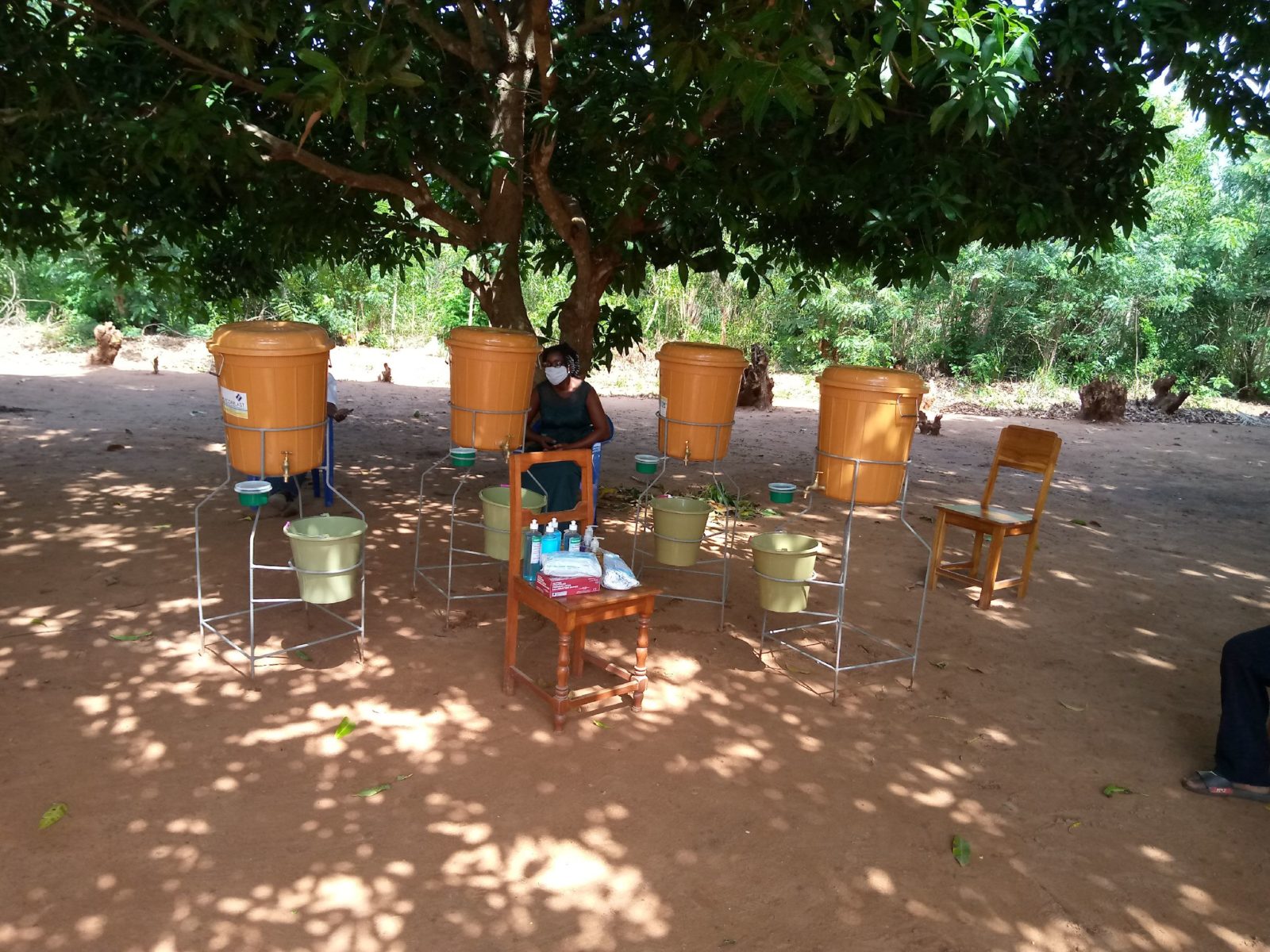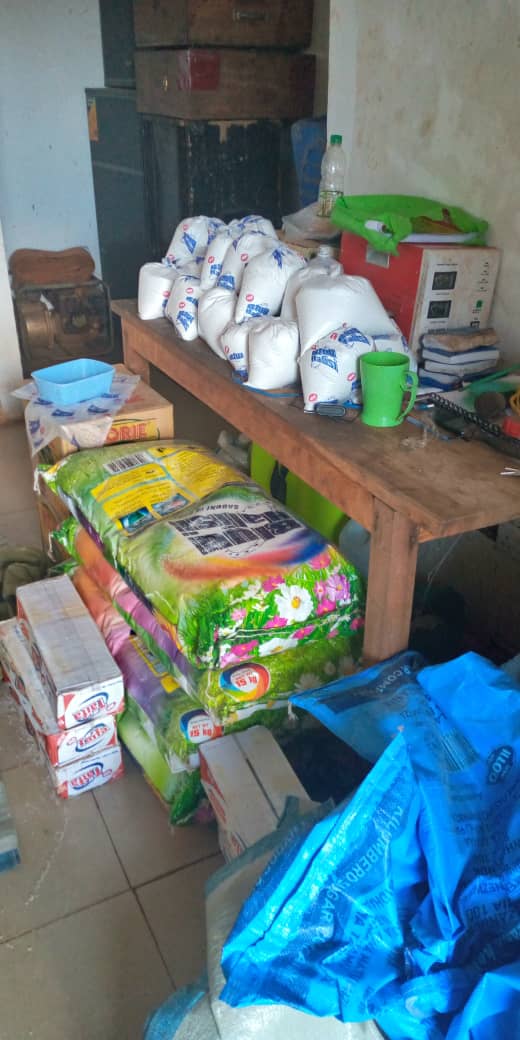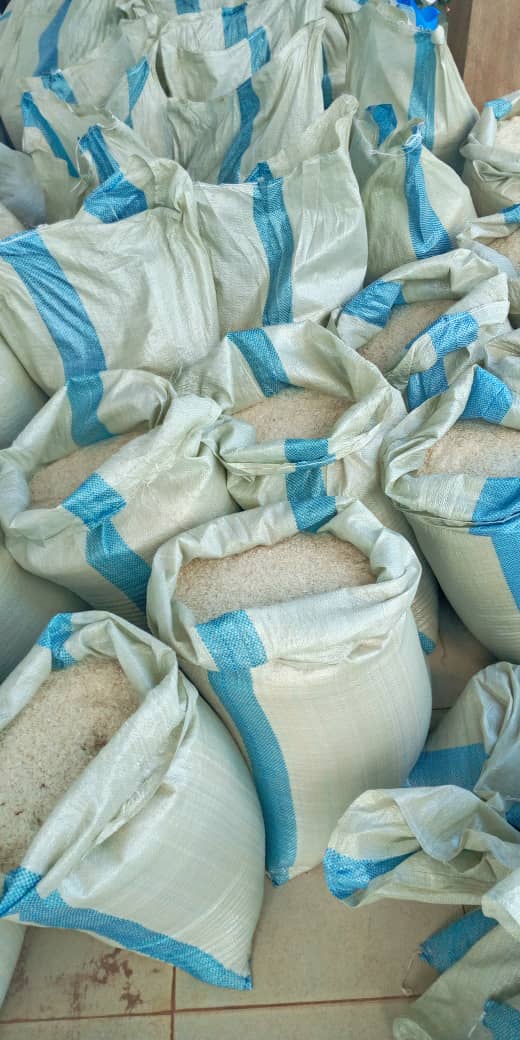“The COVID-19 crisis has been very tough for us,” Pastor Pascal, leader of the Assemblies of God church in Gbegbessa, Benin, shared. “We have lacked food and we have not found anybody to come to our support. Hadn’t we had faith in God, we would have abandoned the ministry. Very few church members would ask to know how we were doing and help. We were abandoned to our own.”
The church was planted back in 2010 as part of Global Aid Network’s (GAiN) water and church planting strategy. Villagers received access to both safe water through a deep-capped water well as well as had an opportunity to hear about Jesus. Pastor Pascal, which was from a church in a nearby village (called a mother church), committed to a long commute to this church plant, so that he could invest time in the new church.
“I did a lot of teaching by myself or through a lay leader and was able to baptize a bunch of people there. I have taken care of the church like [I did with] the mother church, being with them on a regular basis.”
In February 2020, the church started an evangelism program, which resulted in increased church attendance. But when COVID-19 hit not too long after, the country implemented restrictions on public gatherings in groups, meaning that church meetings were no longer permitted. Many churches, including the one in Gbegbessa, had to meet in member homes for shorter periods of time and in smaller groups. Eventually, the church in Gbegbessa decided to stop small house meetings and instead have Pastor Pascal go house to house to visit members’ homes on his own.
GAiN has been connecting with pastors in Benin, Togo, and Tanzania during the pandemic, through calling and texting, to offer support and coaching.
The goal is to provide pastors with the tools to help promote health and encouragement to their communities, bringing knowledge and hope. Pastors help spread the message on how to reduce the spread of the virus, as well as provide care for church members and encourage their members to demonstrate love in their communities.
Government restrictions in response to COVID have also heightened food insecurity in these countries. To help alleviate some of the burden, GAiN is providing one to two months worth of food to pastors and their families (approximately 450 pastors in Benin, 200 in Togo and 40 in Tanzania) as part of the Pastor Support Program. Pastor Pascal is one of those pastors.
“Two weeks ago, I received a call from the GAiN people who wanted us to come for a meeting. I was very glad to hear that because I know these people may want to support us in some way. I started to call them on a regular basis to make sure I don’t miss the opportunity,” Pastor Pascal said.
“As I got to the GAiN office, I noticed bags of rice and am happy because I am sure I am going to bring food back home for children, my wife and myself. We will cook food and rejoice. This food will last for many weeks. Everybody in my household will be very happy.”
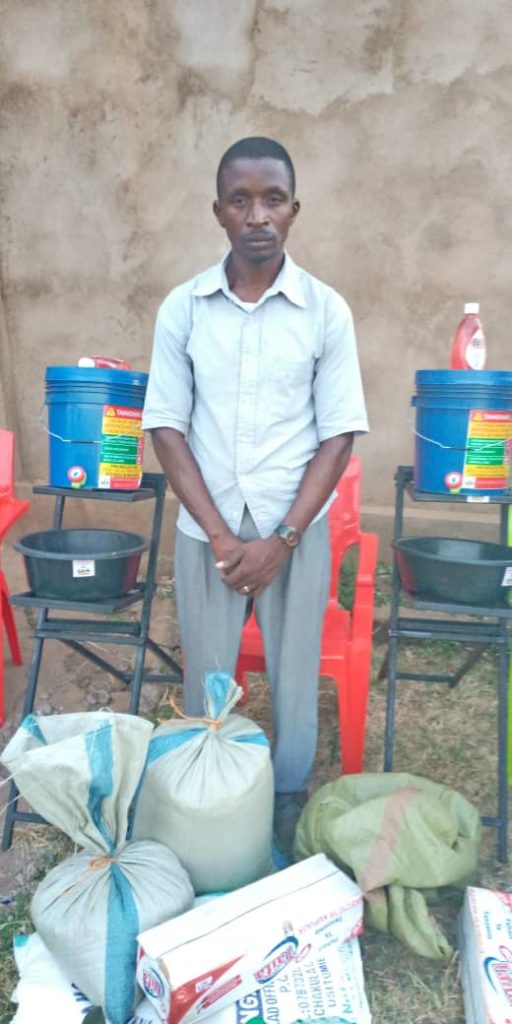
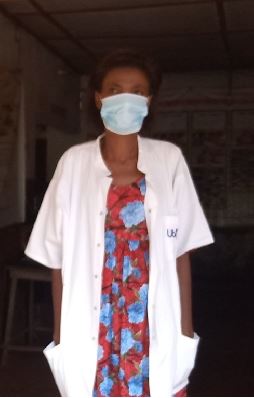
In May of this year, our Water for Life Initiative (WFLI) teams completed the first of three rounds of our COVID response (as of today, our teams have completed three rounds). Teams delivered handwashing stations and soap to community clinics in rural Benin and Togo, to help support clinics with low resources. We also provided personal protective equipment (PPE) and instructions on how to prevent infection. Each clinic received five handwashing stations with soap and water, 100 masks, 100 pairs of gloves, and sanitizer fluid.
Ida Hedje, the supervisor at the clinic CS de Attogon in Benin, told our teams that the new equipment gave her and her colleagues a sense of security because it helps reduce the risk of contamination for themselves and visitors to the clinic.
Silete Henemi, the manager at USP Klologo in Togo said, “This new equipment is going to serve us to protect all the clinic workers. We will also use the mask as protection to our patients and let everybody that is coming to the clinic to wash their hand properly before having access to the clinic.”
“This new equipment will help us to be more protected in our interventions with patients and also help the community practice hygienic measures to fight against COVID-19 contamination,” Kodjovi Niamessi, manager at USP Atovou in Togo, said.
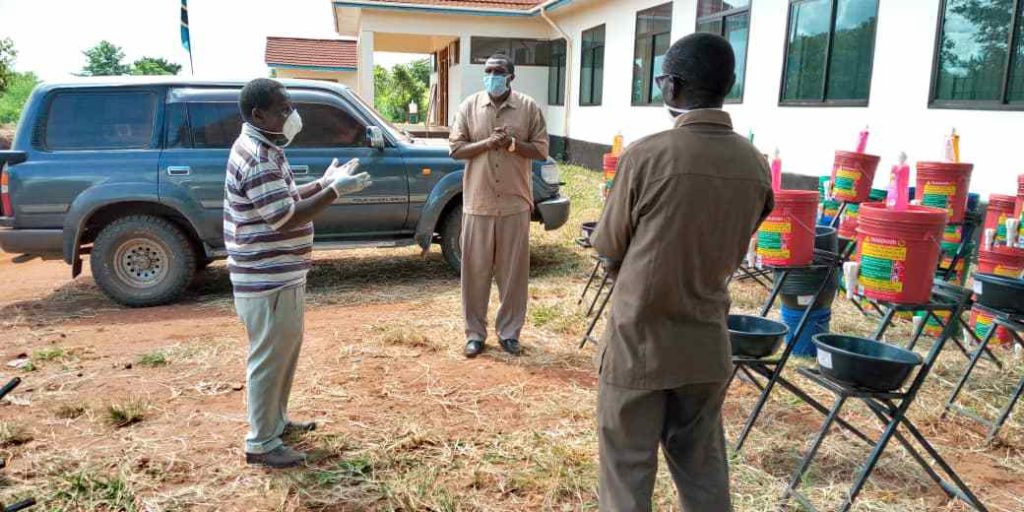
Current State of COVID-19 in Sub-Saharan Africa
With the growing impact of Novel Coronavirus (COVID-19) globally, there are heightened concerns about the fragile state of health and hygiene in Sub-Saharan Africa.
As of May 12, there are over 63,000 total confirmed cases in the African subcontinent and over 2300 deaths1; most cases are found in South Africa, Algeria, and Nigeria at this time. There are confirmed cases in each of our program countries, Benin, Togo, and Tanzania2. While case numbers are currently low, there are many speculations for why that is. It could be due to low testing rate and reporting, it could also be due to warmer temperatures (which affect the spread of similar viruses), it could be due to low levels of urbanization leading people to travel less frequently and therefore have fewer opportunities to come in contact with the virus3. Regardless of the reason, it is clear that with weaker health infrastructure and more limited access to hygiene and water resources that there is cause for concern as numbers continue to increase.
COVID-19 is also starting to affect an increasing number of healthcare workers, so far at least 1000 healthcare workers have been infected, two have been recorded in Benin and one in Tanzania4. There are concerns as this number increases, as the health infrastructure can be fragile and not adequately resourced.
In attempts to slow the spread of the virus, some countries such as Tanzania have begun to take action by banning public gatherings. Togo is among other African nations that have made the decision to close schools and limit access to borders as a precautionary measure. However, many governments have yet to respond to the growing threat.
Potential Impact of COVID-19 in Sub-Saharan Africa
Due to limited access to health and hygiene knowledge and restricted health infrastructure, there is concern over the ability of current health resources to be able to support and provide adequate information and services to the population as confirmed cases of COVID-19 increase. Not only is the response a concern, but this will also divert resources from other important health resources. For example, studies found that during the Ebola outbreak in Sierra Leone that the decreased utilization of reproductive health services led to at least 3600 additional maternal, neonatal and stillbirth deaths in 2014-20155. Limited access to health services and supplies is a consistent concern throughout the region of Sub-Saharan Africa, and definitely in rural Benin, Togo and Tanzania where GAiN operates.
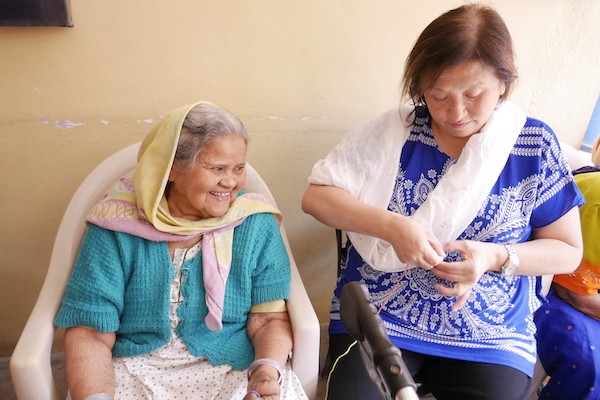
Misinformation in communities is another concern with regards to health information regarding COVID-19. Many rural communities lack basic health literacy and are not adequately connected to health services such as local clinics6. This also leads to communities not being properly informed or believing unhelpful myths. This was an issue in West Africa during the Ebola crisis, where people either did not initially believe or trust health officials and sought information and treatment from improper sources7. It is important that these same mistakes and patterns are not repeated and that communities are engaged with appropriate messaging from reliable sources, and that local leaders are utilised in these efforts.
In Sub-Saharan Africa, 75% of the population has either no access or limited access to handwashing facilities; 61% have access to safely managed or basic water resources, which is also essential to hygiene promotion8. These are concerning figures, especially as handwashing and hygiene promotion are the primary identified ways to prevent exposure to and prevent the spread of COVID-19. In a technical brief released by WHO and UNICEF there were a few pieces of important information highlighted, including frequent and proper hand hygiene, and continued safe management of drinking water and sanitation services. These two principles have many additional benefits to communities including preventing infectious diseases as a whole each year9.
How Handwashing and Hygiene Promotion is Helping Against COVID-19
The World Health Organization (WHO) has consistently said the best way to protect yourself and others from getting sick is to wash your hands with clean water and soap or an alcohol-based rub. According to the Joint Monitoring Programme published in 2019, only 51% of health care facilities in Sub-Saharan Africa had alcohol-based hand rub at points of care and only 64% of non-hospital healthcare facilities had hand hygiene facilities.
The Office of the High Commissioner for Human Rights (UN Human Rights) released a statement on March 23, 2020 stating the COVID-19 will not be stopped without providing safe water to people living in vulnerability10. This statement highlights the need and importance of access to safe water, which is essential to the practice of handwashing, but also the potential harmful implications for communities and people for which access proves more challenging.
What GAiN is doing
For many years, GAiN has been working with rural communities and local health centres in Sub-Saharan Africa to provide clean water and train people on how to effectively manage their hygiene, including handwashing. These valuable resources and skills have developed the preparedness of rural communities to prevent the spread of harmful diseases. Since these WASH interventions, communities have been practicing good hygiene behaviours which has improved their health and hygiene, and has had a ripple effect in surrounding communities.
This work is especially important now, as many underserved rural communities need to be educated and equipped to prevent the spread of dangerous infectious diseases. GAiN works to drill deep-capped borehole wells to provide sustainable access to safe water, then community trainings are facilitated to teach proper hygiene and sanitation practices. This includes essential knowledge about infection prevention and control through germ transmission mapping and effective handwashing practices. These activities work to build community health resilience which enables people to prevent the spread of infectious diseases and withstand the impacts of them within their community.
GAiN’s COVID response so far
As part of GAiN’s COVID response, GAiN has partnered with rural clinics in Benin and Togo that are low on resources, so that they can be better equipped and prepared to handle an outbreak. GAiN had previously worked with these clinics for the Maternal, Newborn and Child Health (MNCH) project in 2017 and 2018.
As of May 2020, GAiN has completed its first round of COVID response. Each clinic received five handwashing stations with soap and water, 100 masks, 100 pairs of gloves and sanitizer fluid.
Workers from clinics that received equipment reported that they felt a greater sense of security, as it helped reduce the risk of contamination for both workers and patients.
“This new equipment is going to serve us to protect all the clinic workers. We will also use the mask as protection to our patients and let everybody that is coming to the clinic to wash their hand properly before having access to the clinic,” Silete, a manager at one of the clinics, said.
Will you partner with us to help reveal hope and restore life through our COVID Response? Together, we can help communities slow the spread of the virus and help empower their communities with knowledge on how to stay safe.
1 https://www.afro.who.int/health-topics/coronavirus-covid-19
2 https://apps.who.int/iris/bitstream/handle/10665/331989/SITREP_COVID-19_WHOAFRO_20200506-eng.pdf
3https://theconversation.com/covid-19-in-africa-fewer-cases-so-far-and-more-preparation-needed-133539
4 https://theconversation.com/covid-19-in-africa-fewer-cases-so-far-and-more-preparation-needed-133539
5https://www.cgdev.org/blog/how-will-covid-19-affect-women-and-girls-low-and-middle-income-countries
6 Nutbeam, Don (2000). “Health literacy as a public health goal: a challenge for contemporary health education and communication strategies into the 21st strategy.” Health Promotion International 15(3), 259-267
7 https://www.odi.org/blogs/16779-covid-19-five-lessons-ebola
8http://washdata.org
9 WHO and Unicef (2020). “Water, sanitation, hygiene and waste management for the COVID-19 virus.” Technical Brief.
10https://www.ohchr.org/EN/NewsEvents/Pages/DisplayNews.aspx?NewsID=25738&LangID=E
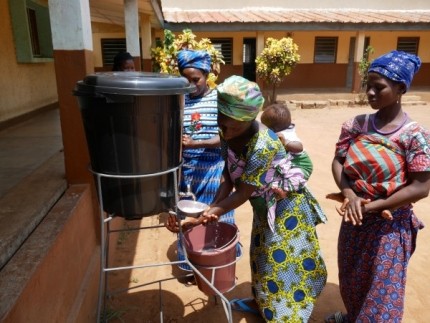
With the first case of Novel Coronavirus (COVID-19) in Sub-Saharan Africa confirmed by local authorities in Nigeria, it’s worth thinking about how to reduce the spread of this disease. The World Health Organization (WHO) has consistently said the best way to protect yourself and others from getting sick is to wash your hands with clean water and soap or an alcohol-based rub. According to the Joint Monitoring Programme published in 2019, only 51% of health care facilities in Sub-Saharan Africa had alcohol-based hand rub at points of care and only 64% of non-hospital healthcare facilities had hand hygiene facilities.
Long before COVID-19, GAiN has been working with rural communities and local health centres in Sub-Saharan Africa to provide clean water and train people on how to effectively manage their hygiene, including handwashing. This work is especially important now, as many underserved rural communities need to be educated and equipped to prevent the spread of dangerous infectious diseases.
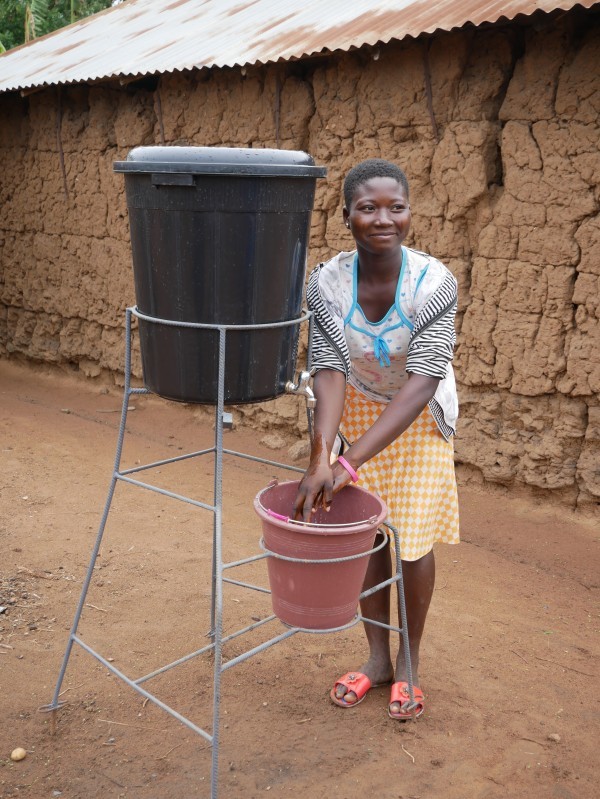
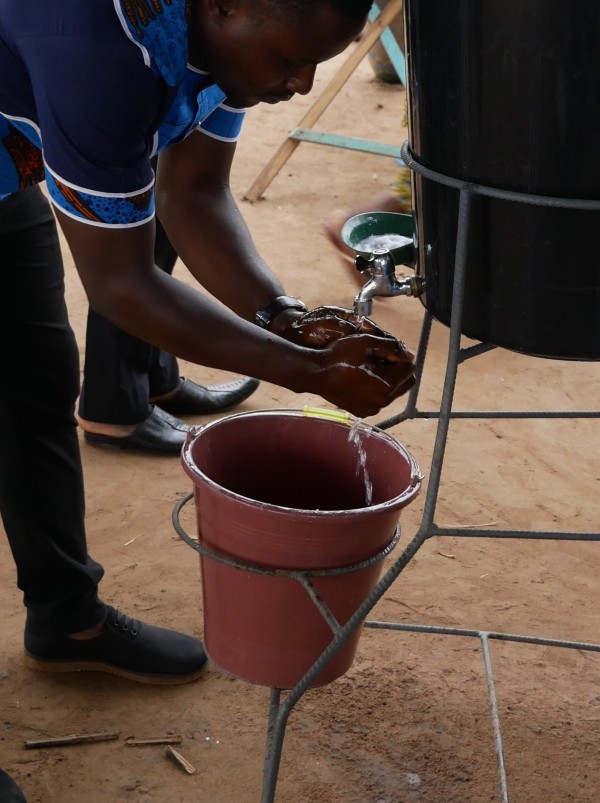
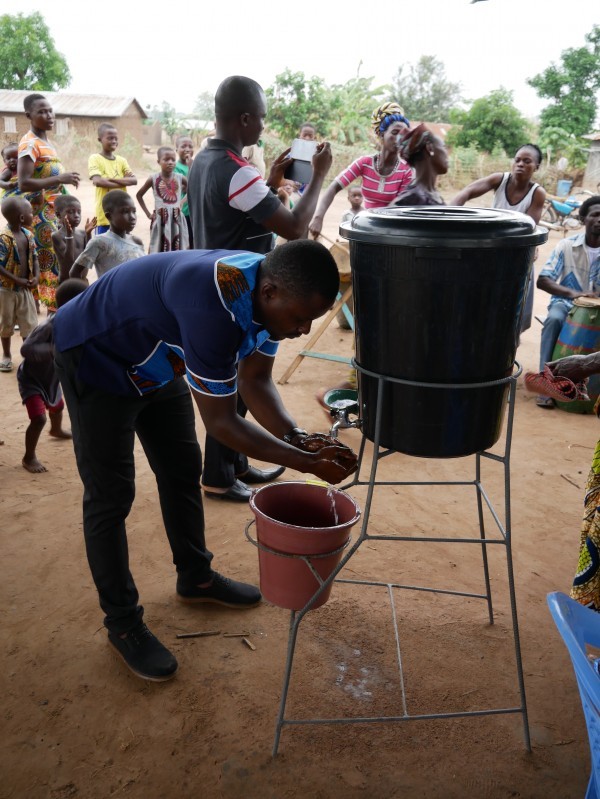
To help communities and health centres in Sub-Saharan Africa access clean water and hygiene check out our Water for Life Initiative.
To learn more about protecting yourself against the COVID-19 virus, go to: https://www.who.int/emergencies/diseases/novel-coronavirus-2019/advice-for-public
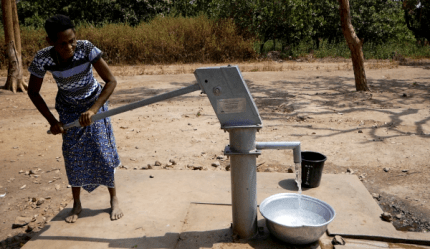
In Benin, when visitors come to your village, you welcome them by offering a drink of water. The village of Wession Camp Peulh in Northern Benin had a problem with this custom. The only water they had available was dirty and unsafe to drink. They would collect it from holes that they dug in the ground, out in the bushes, and scoop it out into buckets to carry back to their village. It would cause sickness and disease for the community, but it was their only water source so they had no other option but to drink it. But when visitors came through, they were ashamed to offer their dirty water to guests.
Since Global Aid Network (GAiN) Canada was able to drill a deep-capped water well in April 2018, the people of Wession Camp Peulh gained access to clean, safe water. The well is properly sealed with a hand pump that protects from contamination and allows for easy collection and distribution of the water.
In Benin, when visitors come to your village, you welcome them by offering a drink of water. The village of Wession Camp Peulh in Northern Benin had a problem with this custom. The only water they had available was dirty and unsafe to drink. They would collect it from holes that they dug in the ground, out in the bushes, and scoop it out into buckets to carry back to their village. It would cause sickness and disease for the community, but it was their only water source so they had no other option but to drink it. But when visitors came through, they were ashamed to offer their dirty water to guests.
Since Global Aid Network (GAiN) Canada was able to drill a deep-capped water well in April 2018, the people of Wession Camp Peulh gained access to clean, safe water. The well is properly sealed with a hand pump that protects from contamination and allows for easy collection and distribution of the water.
The women in this village are now proud to offer this new water to their guests. It is not only bringing health and economic stability to the community, it is also allowing them to flourish in their culture and customs.
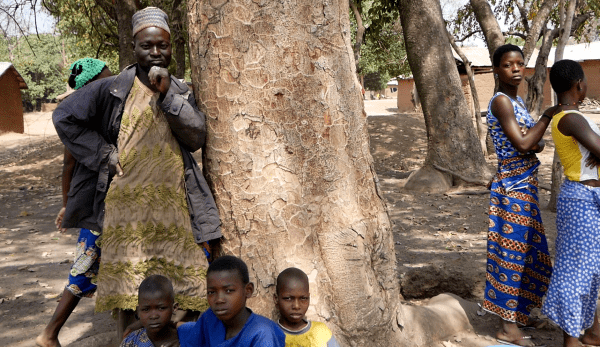
WERE YOU ENCOURAGED BY THIS STORY? SHARE THE STORY AND/OR LEAVE A COMMENT BELOW!
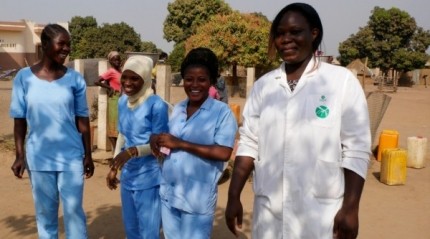
Elvie is the head medical doctor at the health centre in the village of Woria in Northern Benin. She runs a team of nurses to provide health services to the community. The team, more than anyone, knows how essential clean water is to health.
Clinic staff used to have to ride motorcycles to purchase water from the surrounding area – a challenging, time-consuming and expensive task. This arduous process caused many difficulties, especially during emergency situations.
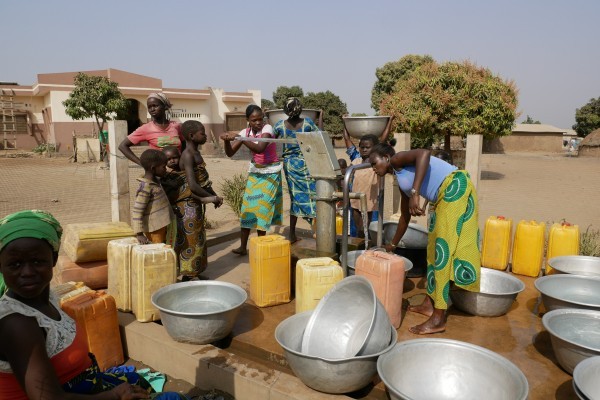
In July 2018, Global Aid Network (GAiN) was able to provide Woria with a deep-capped water well, right in front of the village health centre. Its location makes it a great benefit to the staff at the clinic and the community members that rely on the clinic’s services.
Health professionals at the clinic have witnessed how quick access to clean water has impacted the health of this community. They reported that cases of water-related disease have drastically decreased and the health of the population has greatly improved.
Not only is clean water improving health, but changes in hygiene and sanitation practices are playing a role in preventing the spread of diseases. After receiving the well, 137 people in the community attended a hygiene and sanitation training. The training is a facilitated discussion to target unhealthy practices and come up with ways to implement changes, such as proper hand washing with soap.
Because of the wholistic nature of our work, we partnered with the local church to show the JESUS film to the community. Two hundred and sixty-nine people attended the showing, where they got to see and hear about Jesus. Of the 269 who attended, 12 people made the decision to follow Jesus and seven attended a follow up.
WERE YOU ENCOURAGED BY THIS STORY? SHARE THE STORY AND/OR LEAVE A COMMENT BELOW!
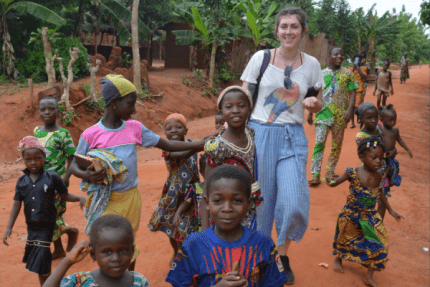
After spending a week in Benin on a LIFE Team Vision Trip with Global Aid Network (GAiN), Rachel Botma had visited enough villages to see the contrast between communities with access to clean water and those without.
“Just to see the enormous impact that having clean water has on a community was really something. You could really tell the difference between the communities with and without. Not just wells, but churches, too. There seemed to be so much more life, joy and vigour at the minimum.”
It was back in March 2019 that Rachel, along with her mother and four other team members, joined GAiN to Benin to see the work that is being done on the field through the Water for Life Initiative program.
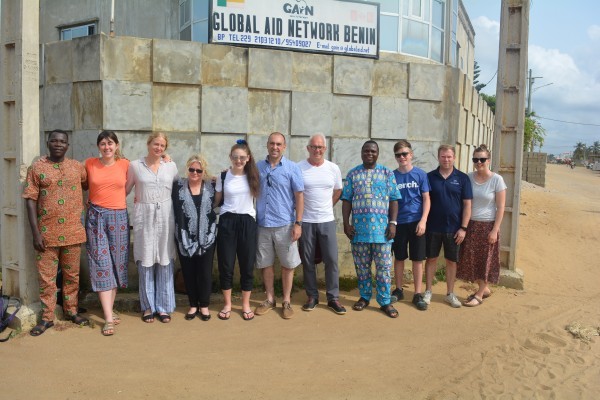
“I have been wanting to get involved in some kind of humanitarian project or volunteer for an NGO for quite a while but never found the right opportunity for me,” Rachel, explained. “Clean water and access to clean water is something that is near and dear to me; something I have been quite passionate about for some time. When I heard about the work that GAiN was doing, [providing] wells for underserved communities and villages, it was something that I knew I wanted to get involved with.”
With this being her first ever trip to Africa, and first trip to a developing country, Rachel signed up with no expectations. She quickly found herself shocked, but says it was a necessary shock.
“We pretty much jumped right into seeing the villages, which I think was really great because it jump-started a lot of powerful conversations and a lot of brainstorming. It was really wonderful for me to pick the brains and hear others pick the brains of some movers and shakers in the humanitarian space. It was quite inspirational for me.”
She recalled the first village they visited, Guede Codji, which was the first village to receive a deep-capped water well from GAiN in 2005.

The team learned about how a lack of clean water exacerbates gender inequality in places like Benin, where women and girls have to give up educational and career opportunities because they are tasked with fetching water for the family. In places where a water source is a few kilometres away, women are often put in danger situations must risk their safety to get water that is contaminated.
“Often these women get sexually assaulted on their journeys for water. That to me was such a horrible reality because they don’t have a choice and they have to put themselves in jeopardy every single day.”
An encounter with a local teenage girl and her father really stuck with her and highlighted the gender inequality issue even more.
“Another conversation that really stood out to me as a huge cultural issue is just how much the girls are expected to work, and how the men just don’t see a problem with it. The most extreme situation we saw was with this 16 year-old girl, Clarice, and her father. When I first saw Clarice, I said to my mother, ‘Wow, that young girl must be nine months pregnant with twins.’ Turns out, she has sclerosis of the liver.”
There was another team member on the trip, named Abel, who happened to be a doctor and was able to talk to Clarice’s father about her medical history. It was her second time developing the condition. Abel advised Clarice to take it easy, telling her father not to let her carry anything heavy and to send her to a doctor. While Clarice and her father seemed to understand and agree, Rachel was very disappointed when she saw that not more than 15 minutes later, Clarice was carrying large pails of water over her head as her father watched on his bicycle.
“The point of this story is to show just what a woman or girl must endure without say, the expectations of them, their lack of rights, and also dignity,” Rachel explained.
Not only did Rachel witness gender inequality in the field, she also saw what the reality was like for villages without a clean water source versus villages with wells.
“One thing that really struck home for me was seeing the water source of one of the villages, which they called a river but was nothing more than a stagnant swamp — smell included. During our time there, we got to see a well constructed and become operational for that village. [It’s] crazy to think [that] what we take for granted, something as simple as water, can have such a huge impact.”
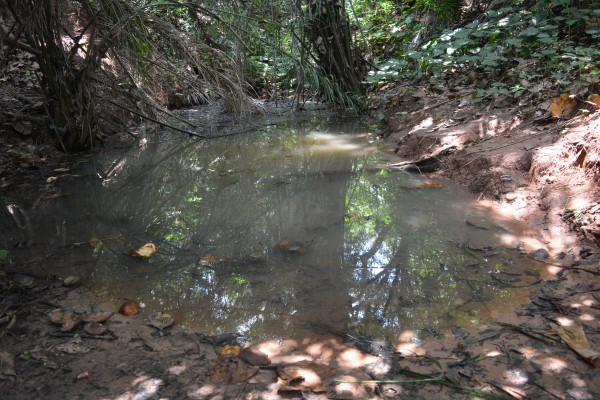
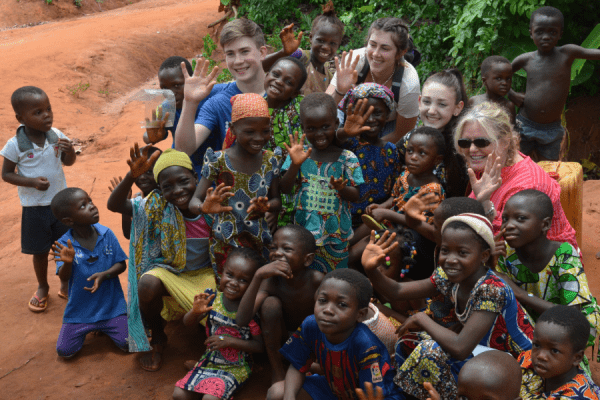
She observed that the impact of clean water was truly evident in the joy of the children.
“I noticed in the communities that had [deep-capped water] wells, the children were acting like children. They were silly and playful like children should be. In the villages without wells, and especially in the villages with a lot of voodoo (which you could really feel a dark, heavy spirit), the children seemed so lifeless. No emotion; no reaction to anything. I mean, comparing the two is almost a day and night difference.”
Although it was only a little over a week long, the trip provided Rachel with multiple learning opportunities, whether it was through speaking with villagers or GAiN staff from Canada or Benin.
“It was really encouraging to meet the GAiN staff. I mean, you could feel the blessing in the GAiN house, radiating off of the staff.”
The first full day consisted of a staff meeting, giving the team an opportunity to meet most of the staff, hear their testimonies and learn about the work that they do. They had the opportunity to dance and sing together and hear a message from Patrice Lavagnon, GAiN Benin country manager, and Ray Sawatsky, GAiN’s CEO and Executive Director.
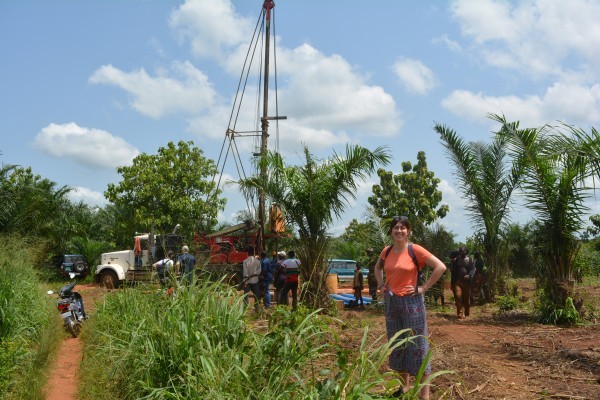

“We were able to see the community that has been built around GAiN. It was a wonderful experience. One that I had never been a part of before; non-traditional worship, and feeling its impact. It was a blessing for me to be a part of that and I am very thankful.”
And the vision trip was just the start of Rachel’s involvement with GAiN, as she hopes to stay involved in the future.
“I am interested in hearing about more opportunities for me to continue involvement whether it could be to go on another vision trip, volunteering or even employment. It is a smart organization, and one with the values that I can stand behind.”
ARE YOU INTERESTED IN GOING ON A LIFE TEAM VISION TRIP? CHECK OUT OUR UPCOMING LIFE TEAM VISION TRIP DATES.
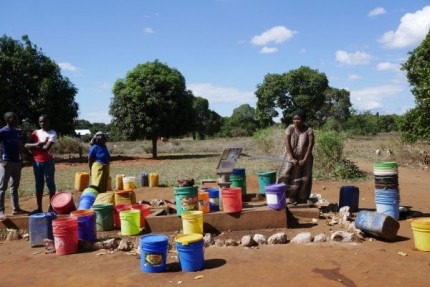
Water is a hot commodity in the village of Nangumbu B in southern Tanzania. Recently, Global Aid Network (GAiN) provided a deep-capped water well to this community and the village is putting it to good use. The water point is constantly buzzing with people coming to fill buckets from their homes, schools and places of work. It has become the center of activity in the village and at peak times, the well draws great crowds.
While people wait in line they talk and share about their families and their days at work. Some of the women of Nangumbu B cleverly decided to take advantage of this new hub and set up a small stand next to the well to sell tomatoes and other local produce. Now, as people are waiting for water, they can shop at this mini market.
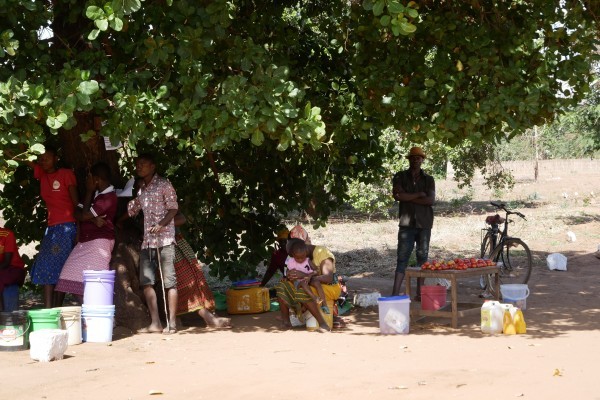
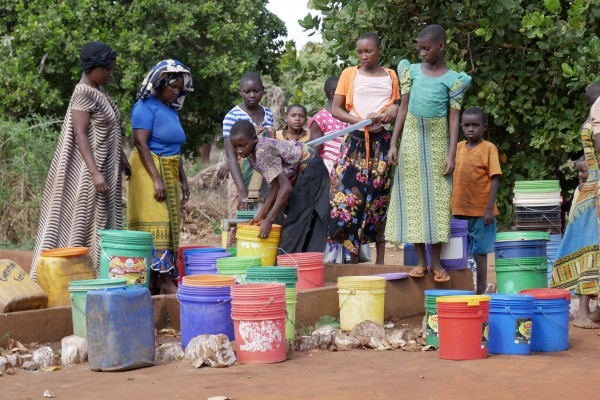
The convenient location and in-demand stock has led to a thriving business for these women and they are making good sales. These smart business women are hoping to grow their stand and provide more options to the people. The water point is evolving into an economic and social hub, enabling safe use of clean water while promoting local businesses, furthering the wholistic development of this community.
As economic opportunities continue to grow in Nangumbu B, so does the local church. Since the provision of the well, five JESUS film showings have taken place in the village. A total of 1,574 people attended the showings and, after seeing the film, 83 people made the decision to become followers of Jesus and attend a follow up. In May 2019, a new church was planted in the village, giving these new believers a new place to gather for worship and grow in their faith.
WERE YOU ENCOURAGED BY THIS STORY? SHARE THE STORY AND/OR LEAVE A COMMENT BELOW!
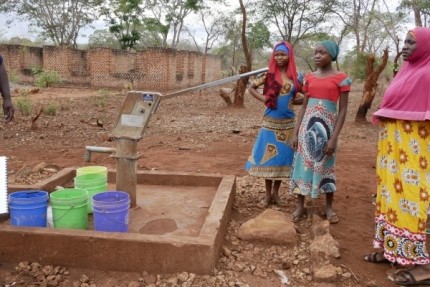
The GAiN Tanzania team recently drilled a well in the village of Liugulu on the grounds of a secondary school where a number of students live during the school year. When we came to visit, we were greeted by a few students.
Lack of clean and safe water affects the education of many students who spend plenty of hours a week collecting water. Unfortunately, this isn’t uncommon. According to UNICEF, one out of every six secondary schools have no drinking water service. 1
Before the well was provided to Liugulu in May 2019, their nearest water source was a small river a few kilometres away. Students had no choice but to fetch buckets of water in the early morning hours or late at night, to ensure that they did not miss classes.
Not only did collecting water take up much of their time, the water was contaminated and often caused them to fall ill, resulting in absences due to sickness. Sadly, up to 443 million school days are missed worldwide, each year, due to water-related illness. 2
But now, with a water source right next to their school, these students are able to enjoy the full health benefits of clean water and the freedom to attend classes and focus on their studies without worrying about the burden of funding water.
We had the opportunity to speak with these students about what dreams they had for the future. Some wanted to be doctors to help heal the sick, while others wanted to be police officers to help protect people.
One girl said she wanted to be a teacher. Her desire was to come back to teach at this school because of the positive impact it has had on her life. Having access to this water source removes a significant barrier for these students to realize their potential. They are now one step closer to seeing their dreams become reality.
1 UNICEF https://www.unicef.org/eap/wash-schools-fast-facts
2 Human Development Report, 2006 https://www.wateraid.org/facts-and-statistics
YOU COULD HELP A VILLAGE LIKE LIUGULU GET ACCESS TO CLEAN WATER. WILL YOU GIVE TO MAKE AN IMPACT TODAY?
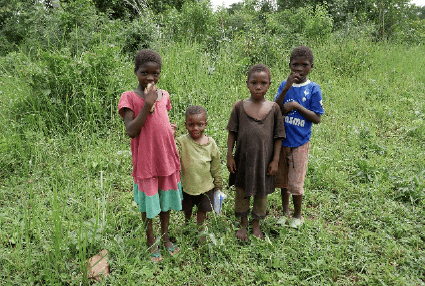
The village of Okafou lies in a beautiful, remote region of central Togo.
The people of this 578 population village, and students from the adjacent school, used to fetch water from a distant river. The river water was contaminated and resulted in waterborne sicknesses within the community. Children who were sick often missed class at school. Others arrived late after fetching water from the river for their families.
On August 23, 2018, Global Aid Network (GAiN) was able to provide a deep-capped water well in the school yard for the students and villagers to access. This well provides clean water that no longer contains harmful bacteria. Children are able to access it freely during the day.
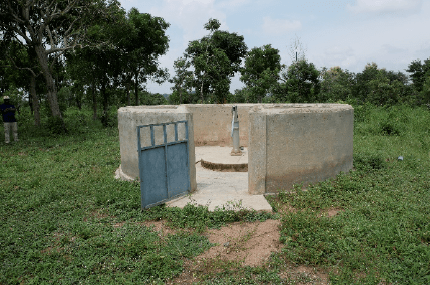
In addition, the school is now held in a large protected building, which greatly improves the learning environment for the children. Before this building was built, students attended class outside under open shelters. The new school building was provided in part by one of GAiN Togo’s board members. This board member also built a camp facility next to the village, which periodically hosts youth from the city of Lomé, Togo. The goal of the camp is to provide youth development, which involves living at the camp and spending time with the villagers in Okafou.
But the benefits of access to clean water don’t just end there for the people of Okafou. Five months after providing the well, GAiN partnered with the local church and showed three JESUS Film showings over the course of three nights as part of the water and church mobilization strategy. A total of 744 people attended the film showing, where they learned about the Good News of Jesus. After seeing the film, 10 people made the decision to become a follower of Jesus Christ.
Providing the well opened up the doors for the gospel to be shared and for people to receive the Living Water. This is yet another testimony of how the impact of a well has multiplied and resulted in wholistic life transformation.

